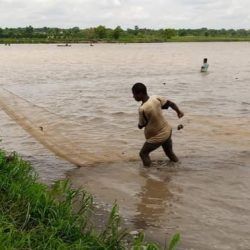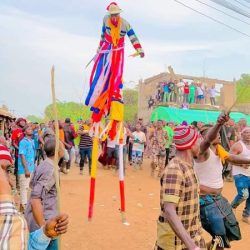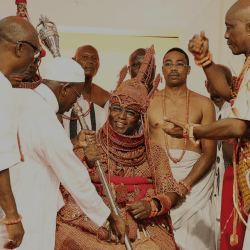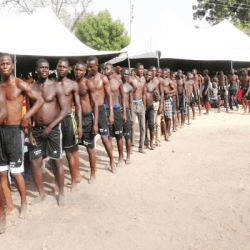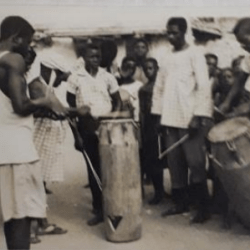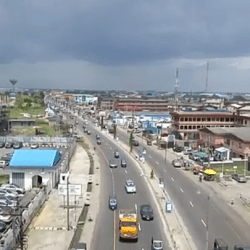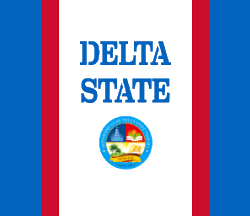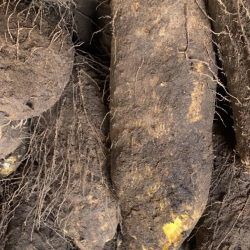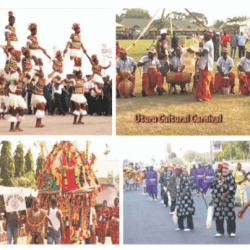Igwe Festival is celebrated to honour the adventurous warrior-king and founder of Owa-Kingdom. The highlights of the festival are preparation and construction of masks, mock coffins, playing of mock orale and cleansing of the land known as “Ilu-Ubiri”.
Town
Owa Kingdom
LGA
Ika North East
Period
February (annual)


Other festivals in Delta
Festival
Ogbanigbe
Description
This festival is for purification of the land in readiness for the celebration (annual) of the new yam festival. War songs and dances feature prominently during this period, the elders pay tribute to their ancestors.
Town
Obior
LGA
Aniocha North
Period
September
Festival
Egwu-Afa
Description
This festival is for purification, cleansing of the land warding off evil spirit. It is characterised by the displays of some energetic young men who after taking some portions, are believed to possess the power to cap- ture the evil spirits, place them in a calabash and throw to the evil forest.
Town
Obomkpa (annual)
LGA
Aniocha North
Period
February
Festival
Ishe
Description
Ishe festival is celebrated with funfair and pageantry for peace, progress and preservation of cultural heritage. Songs are specially composed to ridicule bad members of the society. The highlight of the festival is dancing and jubilation for survival at the old market square and regatta display on River Umomi. It is an important event attraction.
Town
Ewulu
LGA
Aniocha South
Period
February (biennial, 2000)
Festival
Ine
Description
This festival is celebrated for peace and unity. It is marked by the paying of tribute by members of the various quarters to His Royal Highness, the Obi of Ogwashi-Uku.
Town
Ogwashi -Uku
LGA
Aniocha South
Period
Sept. / Oct. (annual)
Festival
Okele-Oke
Description
The festival is celebrated to promote and preserve the cultural heritage of the people. The highlight of the festival is the Oki and Okele-Oke masquerade display, dances and chases.
Town
Torugbene
LGA
Burutu
Period
February (annual)
Festival
Awozi-Owu
Description
The festival is in honour of Awozi-Owu masquerade who is believed to bring more births in the community. The highlight of the festival is the display by the elegant and colourful Owozi-Owu masquerade.
Town
Obotebe
LGA
Burutu
Period
January every three years
Festival
Oguberi
Description
It is celebrated in honour of the deity “Oguberi” the principal benefactor of the community. The highlight of the festival are masquerade displays and dances.
Town
Kiagbodo
LGA
Bomadi
Period
December
Festival
Olou-Owei
Description
Olou-Owei is a masquerade festival celebrated in honour of the principal deities in the town. It features a colourful display of masquerades
Town
Bomadi
LGA
Bomadi
Period
March
Festival
Ovwuvwe
Description
This festival is celebrated for protection. On the festival day, young men who had gone for hunting for seven days carry their animals and dance around. The female blessing is received at Abraka Inland with the chewing of orhe (native white chalk)
Town
Abraka
LGA
Ethiope East
Period
May
Festival
Egba
Description
This festival is celebrated to protect the land and its inhabitants from external attacks. Being a festival depicting war, the celebrants use charmed cutlasses and guns.
Town
Kokori
LGA
Ethiope East
Period
February
Festival
Edjenu / Ekene
Description
The festival ushers in abundant blessings for the general growth and development of the land. Participants are young men and women. The highlight of the festival is the climbing of a tall tree beautifully decorated in assorted colours by a participant who is regarded as the “up god”.
Town
Oghara Clan
LGA
Ethiope West
Period
Every 25 years(2007)
Festival
Ore
Description
This festival is celebrated to honour the gods of harvest and war. The Oghorughoru makes offerings to the war gods. The inotus (warrior group) feature prominently during festival.
Town
Oghara
LGA
Ethiope West
Period
Sept/Aug
Festival
Irua-nmo
Description
The celebration of this festival is aimed at warding off all evil in the land. (annual) Sacrifices are offered to different gods such as god of iron. The highlights of the festival are Owowo dance, flogging and wrestling.
Town
Umunede
LGA
Ika North East
Period
Sept. / Oct (annual)
Festival
Osiezi
Description
The celebration symbolises a call on all people to come and witness the cultural heritage of Agbor. It is aimed at perpetuating the glory and splendour of Agbor Crown – the great “Dein” monarchy. Owowo and “Izabu” song is sang with reverence.
Town
Agbor
LGA
Ika South
Period
Sept. / Oct. (annual)
Festival
Igwe
Description
The festival was originally associated with a victory at the end of a tribal war, in which those who survived marked such occasion with great joy and thanksgiving activities.
Town
Alisime, Alihiame, Agbor-Nta, Oki
LGA
Ika South
Period
March/April
Festival
Eriokpe
Description
This festival is celebrated to usher in peace and rich harvest. During the period of the festival, the people solicit for protection and blessing.
Town
Ozoro
LGA
Isoko North
Period
April (every five years)
Festival
Owise-Owhe
Description
It is the god of war believed to protect Owhe people during wars. It is celebrated for peace and child production. This festival is characterised by singing, dancing and eating.
Town
Oruovo
LGA
Isoko North
Period
April (every three years)
Festival
Eni
Description
Eni is a goddess of purity, peace, prosperity and protection against evil. It lives in a lake at Uzere. It was once used as an ordeal to prove wickedness as practised by witches and wizards who were dropped into the lake. The lake is now a sanctuary for aquatic animals.
Town
Uzere
LGA
Isoko South
Period
April (biennial, 1999)
Festival
Abame
Description
This festival is associated with initiation into manhood. Only those initiated to manhood or who have positions of responsibility in the community participate in the Abame festival.
Town
Igbide
LGA
Isoko South
Period
March (Every three years) (1999)
Festival
Oje
Description
It is celebrated in honour of Ojie and Eushi, gods of blessings. The Oje is a colourfully decorated masquerade that thrills the spectators. The highlight of the festival is Eushi’s dance in a canoe on the lake.
Town
Aboh
LGA
Ndokwa East
Period
February
Festival
Okpotu
Description
The Okpotu festival is celebrated for peace. Sacrifices are offered to their gods. Female worshippers take active part. The major event is the visit to the traditional ruler, Ase-Igwe.
Town
Ase
LGA
Ndokwa East
Period
October (biennial)
Festival
Ukwata
Description
The festival is celebrated to sacrifice to the ancestral gods of the clan. Alive eagle tied to a stool is carried on the head of each of the special “Ukwata” dancers. Other dance groups also participate. Gifts are exchanged.
Town
Abbi
LGA
Ndokwa West
Period
February (annual)
Festival
Ikenge
Description
The Ikenge festival is celebrated to commemorate the struggles and success of past heroes and to worship gods of achievements. Participants dress in war outfits with charms and amulets.
Town
Utagba -Uno
LGA
Ndokwa West
Period
June (annual)
Festival
Adane-Okpe
Description
The festival is aimed at cleansing and purifying the society. Only men take part in the festival. The festival is accompanied with feasting and merrymaking.
Town
Orerokpe
LGA
Okpe
Period
December (annual)
Festival
Okpoitita
Description
Okpoitita is a deity. The celebration of the festival is meant to purity and protect the society from evil spirit. Masquerade dances and sacrifices are performed.
Town
Iriama
LGA
Okpe
Period
March (every three years)
Festival
Iwu
Description
This festival is celebrated for the cleansing and purification of Ibusa Community. It is a time to thank God for abundant harvest. Songs are composed to ridicule defaulters of the norms and traditions of the society no matter their status. The Chief Priest(Ohene) and the Chief celebrants(Eze Iwus) perform rituals. The highlight of the festival is the moment of exaltation and opalesce.
Town
Ibusa
LGA
Oshimili North
Period
December (annual)
Festival
Ogwu
Description
The festival is meant to combat the ills of the community. Songs are composed to ridicle those who violated the norms and tradition of the society.
Town
Ebu
LGA
Oshimili North
Period
August
Festival
Fishing Festival
Description
It is celebrated to revive their indigenous occupation(fishing) and protect their cultural heritage. The highlight of the festival is fishing at Iyoya lake and other ponds where prices are awarded for the biggest catch.
Town
Oko Amakom Oko-Anala
LGA
Oshimili South
Period
April (Annual)
Festival
Ine
Description
It is-usually celebrated as an end of year activity. The festival features music and dance round the town. (Igbu-Agbo).
Town
Asaba
LGA
Oshimili South
Period
October (Annual)
Festival
Kabowei Seigbein
Description
It is celebrated to purge the town of evil, worship ancestors and pay homage to deified gods and heroes. It is an occasion for family re-unions and receiving the blessings of the ancestors.
Town
Patani
LGA
Patani
Period
April(Annual)
Festival
Odoni Seigbein
Description
It is celebrated to mark important events in the history of the people as well as pay homage to ancestral gods and heroes. It is a great occasion for showing the wealth of the families as costly clothes and coral beads are worn. After every third Odoni Seigbein festival, two masquerades, Mgbele and Amugele are carried alternately round the town.
Town
Odoni Clan
LGA
Patani
Period
May (Annual)
Festival
Urhiepele-ame
Description
This festival is celebrated to appease “Urhiepele” which is a deity. It is also for the purification of the town, peace and prosperity.
Town
Sapele
LGA
Sapele
Period
Any agreed time
Festival
Ibeni
Description
It is celebrated to appease the gods for peace and progress and usher in the new year. It is a masquerade festival where the women perform the “Oje” dance.
Town
Ibode- Eivme
LGA
Sapele
Period
December (Annual)
Festival
Iyei
Description
This festival is celebrated to mark a new era of happiness and prosperity and to appease their gods. During the period, subjects pay homage to the Ovie in his palace with Ema and Ovie dances. The highlight of the festival is the paddling of canoe known as “Umalokun” on a lake.
Town
Ughelli
LGA
Ughelli North
Period
September (Annual)
Festival
Erose-Efe
Description
It is celebrated to re-anact the old tradition of a warrior people. Each clan is led by Ochu (warrior) to the Erose shrine to receive blessing. This is followed by war dances.
Town
Orugun
LGA
Ughelli North
Period
April (Annual)
Festival
Ogba-Urhie
Description
Ogba-Urhie is celebrated to mark the circumcision of matured girls. The festival is celebrated with great jubilation, dances and merry making.
Town
Otu-jeremi
LGA
Ughelli South
Period
July (Annual)
Festival
Igboze
Description
The festival is celebrated to commemorate Igboze the son ofighogho e years) of Benin. Chieftaincy titles are conferred on deserving citizens. There are traditional dances and exchange of gifts
Town
Olomu
LGA
Ughelli South
Period
November every 5yrs
Festival
Epha
Description
This festival is celebrated for the initiation of women into womanhood. The entire community participates.
Town
Otor-Udu
LGA
Udu
Period
June/Sept (Annual)
Festival
Igbu
Description
It is celebrated to purify the land and protect it from outside attack as well as appease their ancestral gods. Mainly warriors of the town take part.
Town
Egini
LGA
Udu
Period
Any agreed time (Annual)
Festival
Owhoru
Description
The celebration of this festival is to ensure good yield of crops and livestock. Owhoru was originally the personal shrine of an Uwvie herbalist. It’s home is located in Effurun River. The climax of the festival is the appearance of Owhoru amidst erotic behaviour and absence talks and songs.
Town
Effurun Ekpan
LGA
Uvwie
Period
July – Oct (Annual)
Festival
Edju-Uvwie
Description
This festival serves the role of protection to the indigenes of Uvwie and also brings progress. It has the capacity to regulate peoples behaviour and unites them.ad priest, great merriment and funfair.
Town
Effurun, Ekpan
LGA
Period
March (Annual)
Festival
Awankere
Description
This festival is celebrated to usher in peace and plenty. The first stage is ritualistic while the second stage is a show of masquerades which is open to public.
Town
Warri
LGA
Warri South
Period
June/July Annual
Festival
Okiroro (Okere)
Description
The celebration is for the adoration of the ancestors of Okere. During this period propitiation is made to all fore-fathers and mothers. The highlight of the festival is the appearance of the “Okere Juju” (masquerade) in a fairly large number from the sites of the shrine and they proceed to the heart of Okere where they do real dancing.
Town
Warri
LGA
Warri South
Period
July/August Annual
Festival
Egbenijokun
Description
An ancient festival celebrated to usher in peace and plenty. Egbenijokun is a deity which has power to kill, save and provide food for the people. The colourful aspect of this festival is a competitive regatta.
Town
Bobi
LGA
Warri North
Period
March/April (Biennial)
Festival
Onemone
Description
This festival is celebrated for peace and plenty by the Ologbotsere and Uwangue, descendants of Jakpa. The festival involves rituals, masquerade displays and ancestral worship.
Town
Jakpa
LGA
Warri North
Period
March/April (Annual)
Festival
Isekpere
Description
This festival is for purification, sanctification, protection and socialisation. Masquerades that represent the deity (Isekpere do display and those who are spiritual children come from far and wide to pay homage and perform sacrifices. Fish-farming activities in the Atlantic is suspended during the festival.
Town
Ugborodo
LGA
Warri South West
Period
Jan-Mar (Biennial)
Festival
Egbudu
Description
It is for the cleansing of the land, protection of the people and provision of wealth in abundance, homages, sacrifices and displays by masquerades repressing the deity (Egbudu) characterised the festival.
Town
Kantu
LGA
Warri South West
Period
Third Quarter (Yearly)
Delta
Delta State is an oil and agricultural state in Nigeria.
Name: Delta State of Nigeria
Founded: 27Aug, 1991
Administrative capital: Asaba
Commercial capital: Warri
The capital of Delta State is Asaba, located at the northern end of the state, with an estimated area of 762 square kilometres (294 sq mi).
Warri is the economic nerve center of the state and also the most populated. It is located in the southern end of the state.
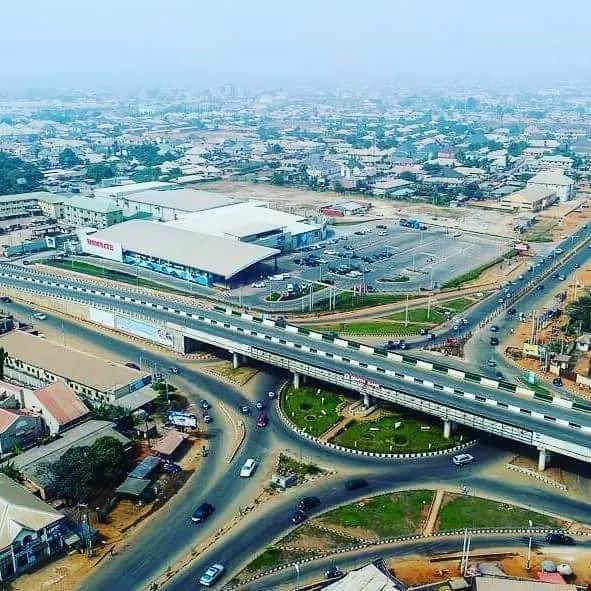
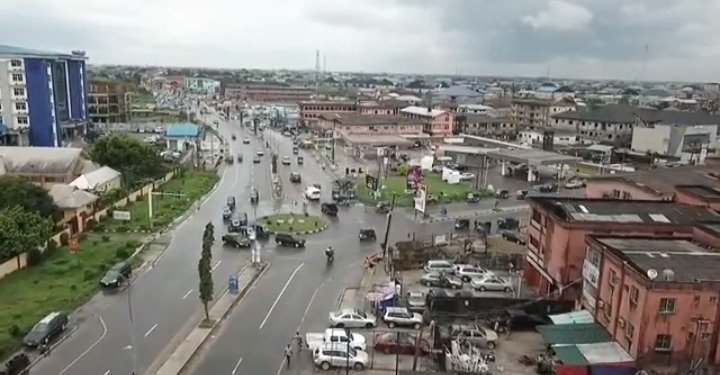
Administrative Areas
Delta State currently has twentyfive local government areas. They are: Aniocha North, Aniocha South, Bomadi, Burutu, Ethiope East, Ethiope West, lka North East, lka South, Isoko North, Isoko South, Ndokwa East, Ndokwa West Okpe, Oshimili North Oshimili South, Patani, Sapele, Udu, Ughelli North, Ughelli South, Ukwani, Uvwie, Warri North, Warri South and Warri South West.
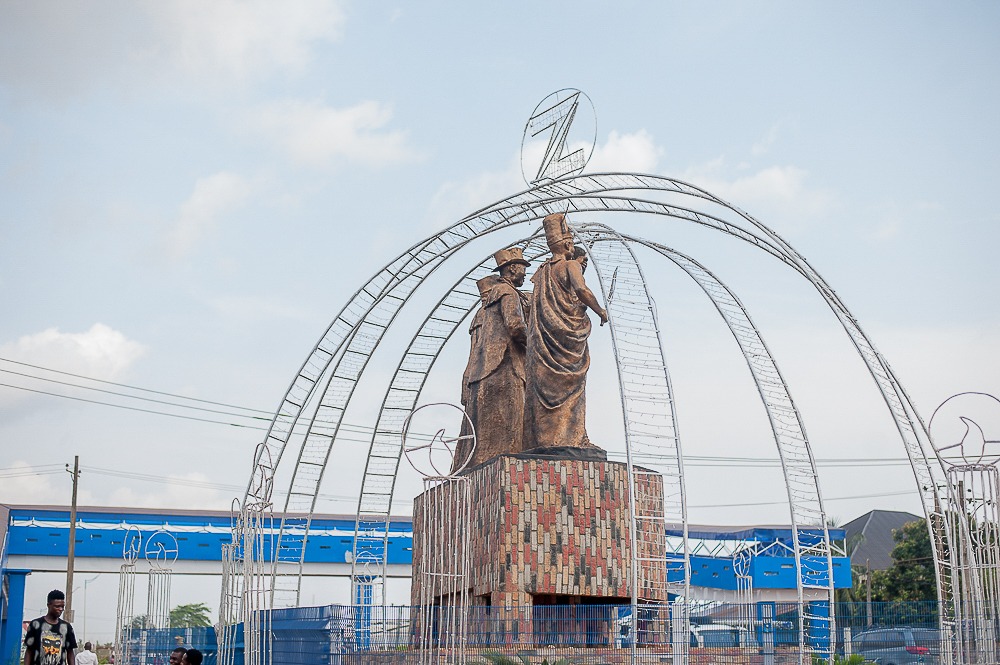
Christianity, which has the largest followership, came through contact with the Portuguese in the 15th century. With Christianity, came a number of complimentary western institutions, the most important of which was western education, hence missionary schools sprang up in Delta State. Modem health care delivery establishments, such as hospitals and maternity centers, were also introduced.



Ethnic Composition
The major ethnic groups in Delta State are Urhobo, lgbo, lzon, Isoko and Itsekiri. Many of the people claim a common ancestry; consequent ly, their cultures are similar. These similarities are manifested in their religious worship, music, dance, festivals, and arts and crafts. The practice of Christianity, Islam and traditional worship like lgbe and Ebura, flourishes in varying degrees among the people of Delta state.
River Ethiope which is reputed to be the deepest inland waterway in Africa (at 176 km).
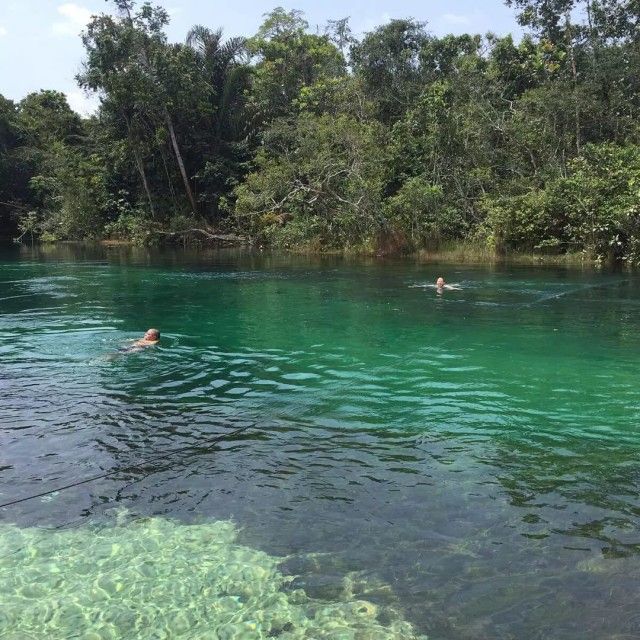
Delta state also has huge deposits of crude oil and is also one of the largest producers of petroleum products in Nigeria. Sales of petroleum products is what majorly drives its economy.
Third Quarter (Yearly)Third Quarter (Yearly)
